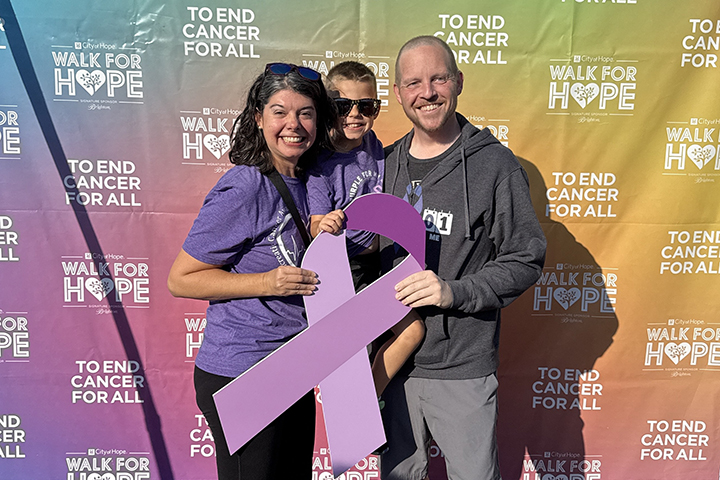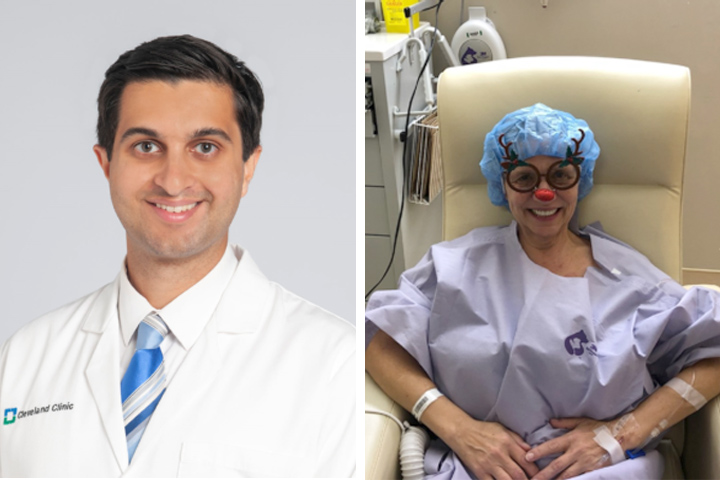Calming the Storm of a Pancreatic Cancer Diagnosis

Finding a sense of control after a diagnosis of pancreatic cancer is not easy.
A diagnosis can create a feeling that your life and plans have been upended and that the future you were expecting has been thwarted. Many patients struggle to control their fears, knowing they are facing difficult treatments and a disease that can be unrelenting.
But by creating a sense of agency—the ability to make choices and take action—you can begin to define your experience in a way you may find helpful.
Identify What Matters Most
E. Angela Heller, a clinical social worker in the oncology department at NewYork-Presbyterian Hospital at Columbia University Medical Center, urges patients to first focus on themselves and what matters most to them.
“It is so important to pull yourself back from the statistics and remember that you are an individual,” says Heller. “You are not one of 50,000 people: you are you.”
Identifying what matters most to you also allows you to make decisions that reflect your priorities. When Marcia Horowitz received a diagnosis of stage IV pancreatic cancer, she and her husband, Richard Cohen, knew that she wanted to approach her treatment on her own terms. While treating Marcia’s cancer aggressively, they also wanted to broaden their perspective to focus not just on her illness but on the fullness of her life. What mattered most to them was their belief that Marcia’s life was bigger than her diagnosis, and that her remaining time had meaning and purpose.
Marcia called this approach “the Smooth River,” named for the peaceful properties of flowing water that helped her to focus her day-to-day life in a way that honored her values. By maintaining order, clarity, and tranquility throughout her treatment, Marcia and Richard found comfort and strength. Defining what mattered most to them—a Smooth River—allowed them to frame their decisions and experiences through the lens of meeting that goal. After Marcia passed away, Richard wrote the book The Smooth River: Finding Inspiration and Exquisite Beauty during Terminal Illness to help others understand their approach to facing a terminal illness.
Ways to Take Control
While Marcia and Richard’s goals focused on adhering to that shared outlook, other patients have different goals. For some, it is important to remain close to home, rather than travel for treatment. For others, it is to find a doctor with whom they feel a connection. Whatever you decide, making choices that prioritize your quality of life can help you regain a sense of control.
Join a carefully curated support group
Heller believes that contact with other people who are experiencing pancreatic cancer can be impactful. The key is to find a group moderated by an experienced facilitator who can help patients build a community together.
“Having a forum to express yourself is tremendously helpful,” explains Heller. In the group she runs, members are able to share their grief, describe feelings they might not share with loved ones, and role-play difficult conversations, such as talking to their kids about their wishes. According to Heller, having a safe space of trust and support greatly lessens anxiety for her group members, and helps each person figure out how best to cope with their experience.
Find small ways to create joy
Small acts of joy can provide an extraordinary lift in mood and outlook, and they can help patients and caregivers feel more like themselves. For Richard and Marcia, candlelit dinners helped them to carve out space each day to feel gratitude and to focus on each other. A trip to a hair or nail salon, a scenic drive or walk, and joining a book club meeting over Zoom are other ways that Heller’s patients have sought joy.
For times when you aren’t feeling strong enough for an outing, lighting candles, listening to a playlist of favorite music, or even spending time in a different part of your home can provide a similar boost. It just has to be grounded in an experience you enjoy.
Practice self-care—both physically and emotionally
For patients and caregivers, it is essential to find space for self-care. For caregivers who are pouring time and attention into their loved one’s treatment, they need to remember their own healthcare needs.
“I’ve had so many caregivers tell me they are neglecting their own appointments or haven’t seen a dentist about a toothache,” says Heller. It is essential that caregivers find the time to attend to their own health needs so that they can continue as a support person for their loved one.
While the experience of pancreatic cancer can feel like you’re lost in a storm, finding connections and prioritizing your own goals can have a huge impact on your experience. Establishing a sense of agency through actions that affirm your sense of self—whether changes in perspective, changes in scenery, or reaching out for support—can smooth the way through turbulent waters and give you strength and comfort throughout your journey.






